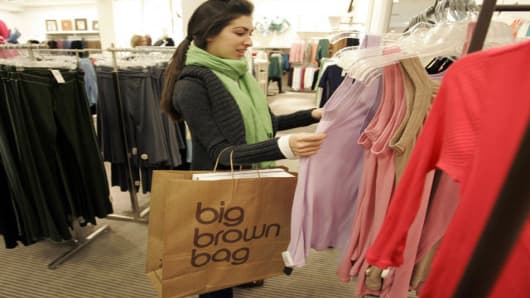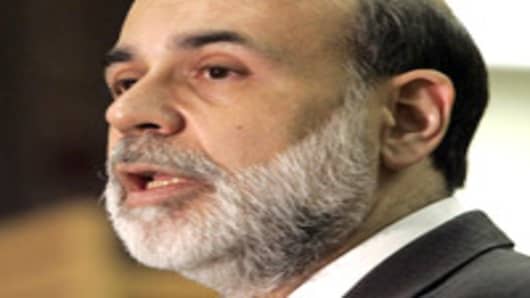Frugal American shoppers cut back on their spending at the nation's retailers by 0.4 percent in December, the most in six months, in a gloomy report that fanned fears of a recession.
The Commerce Department reported Tuesday that the drop in retail sales, which followed a brisk 1 percent gain in November, marked the worst showing since June, when merchant sales declined by 0.8 percent.
Shoppers turned into penny-pinchers under the strains of a deteriorating job market, expensive energy bills and a persistent housing slump that has weakened home values and propelled foreclosures to record highs.
"Consumers held tight to their wallets in December, raising questions about whether household spending will be enough to keep us out of a recession," said Joel Naroff, president of Naroff Economic Advisors.
In another report, the Labor Department said wholesale prices dipped 0.1 percent in December, but were up 6.3 percent for all of 2007, the biggest annual gain in 26 years, mostly reflecting higher energy costs.
Also, business inventories rose 0.4 percent in November, matching expectations, even as firms kept stocks at historic lows in relation to sales.
On Wall Street, stocks tumbled in reactionto the retail sales number and a big loss at Citigroup.
Excluding sales of automobiles, which can swing widely from month to month, sales at all other retailers also fell by 0.4 percent in December, the biggest decline since August.
Weaker Than Expected
The report was much weaker than many economists were expecting. They were forecasting overall sales to be flat last month and for sales--excluding autos--to dip by 0.1 percent.
Odds that the country could slide into a recession this year have grown.
The big worry is that Americans will keep on slicing spending, plunging the economy into a recession.
To bolster the economy, Federal Reserve Chairman Ben Bernanke pledged last week to aggressively lower interest rates. Many economists predict the Fed will slash its key rate, now at 4.25 percent, by a bold half-percentage point later this month. The Fed cut rates three times last year in an effort to induce consumers to boost spending, which would energize overall economic activity.
Even so, a housing slump, weaker home values, harder-to-get credit and high energy prices all "seem likely to weigh on consumer spending as we move into 2008," Bernanke said last week as he warned that downside risks to economic growth have become "more pronounced."
Many analysts predict upcoming reports will show the economy grew at a feeble pace of just 1.5 percent or less in the final three months of last year and will be weak in the first three months of this year as consumers--major shapers of overall economic activity--tighten their belts.
Adding to worry about how consumers will hold up: Consumer confidence, as measured by the RBC Cash Index, fell in January to its lowest point on record dating back to 2002. Worries about jobs, energy bills and home foreclosures darkened people's feelings about the country's economic health and their own financial well-being.
Against this backdrop, the White House and the Democrat-controlled Congress are exploring ways--including the possibility of temporary tax rebates--to get money quickly into the hands of consumers and help stimulate the economy.
For all of last year, retail sales rose by 4.2 percent. That was down from a 5.9 percent increase in 2006 and marked the smallest rise since 2002, when sales went up by just 2.4 percent as the economy was recovering from the 2001 recession.
Spending Gets Hammered
"Higher prices for energy and food, together with falling confidence, are hammering discretionary spending," said Ian Shepherdson, chief economist at High Frequency Economics.
The weakness in the retail sales report was fairly widespread, underscoring the stresses on consumers.
Sales at building and garden supply stores, for example, fell 2.9 percent in December, the most since February 2003. Purchases of electronics and appliances dropped 1.9 percent last month, the most in nearly two years.
Clothing sales declined by 2 percent, the most since September 2005. Sales of sporting goods, music and books also fell by 2 percent. Car sales and department store sales each dipped 0.4 percent. Gasoline station sales dropped 1.7 percent.
A few bright spots: sales at furniture stores rose 0.6 percent. Sales at food as well as health and beauty stores each rose by 0.7 percent and sales at bars and restaurants increased 0.2 percent.
There were a number of reasons why shoppers turned cautious.
One big reason is a weakening job market. Hiring practically stalled in December, pushing the unemployment rate to 5 percent, a two-year high.
Another concern is the meltdown in the housing market, which has dragged down home values and made people feel less wealthy. Harder-to-get credit has made it difficult for some to make big-ticket purchases. And, high energy prices are squeezing wallets and pocketbooks.
Oil prices recently surged past $100 a barrel, though the price has moderated somewhat. The high energy costs for fueling cars and heating homes are leaving people with less money to spend elsewhere, analysts say. In turn, prices for some other goods and services have risen.



